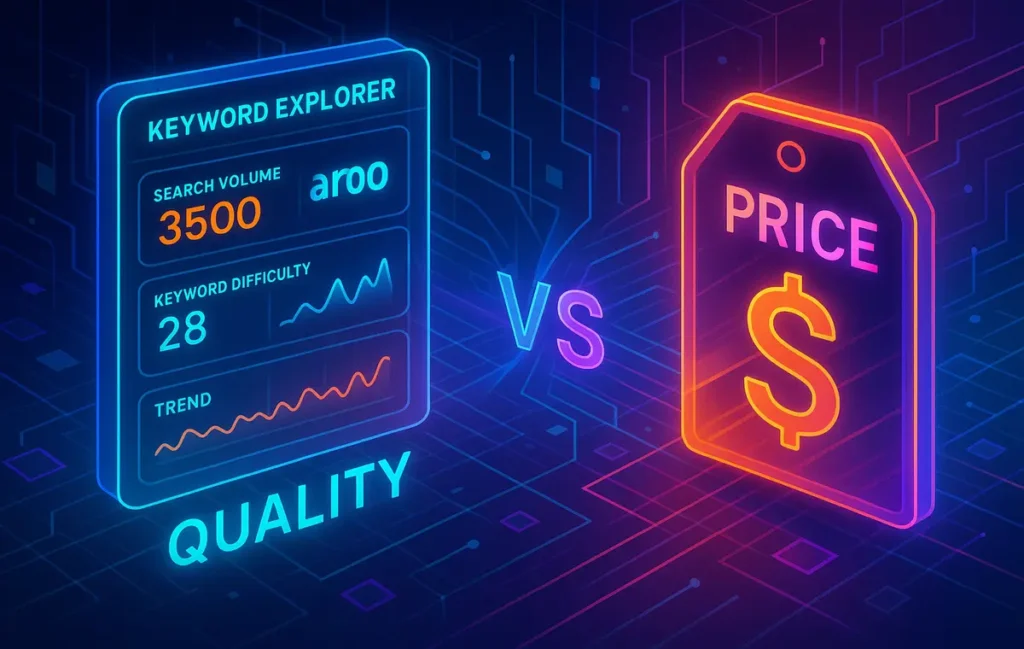🔥 Introduction: Why Ahrefs Sparks the Price vs. Value Debate
Ahrefs is one of the most recognized names in SEO. Marketers, agencies, and founders often describe it as the “gold standard” for backlink and keyword research. Its reputation rests on the quality of its data—especially keyword accuracy and backlink tracking. But alongside its popularity comes a common question: is the price tag justified?
For many freelancers and SMBs, Ahrefs feels expensive compared to affordable SEO tools for keyword tracking. For agencies and enterprise teams, it’s a must-have. The key is whether the keyword data quality and insights Ahrefs provides are strong enough to outweigh the subscription cost.
💡 Nerd Tip: The most expensive SEO tool is the one you never use. The value of Ahrefs depends on how deeply you integrate it into your workflow.
📘 What is Ahrefs?
Ahrefs is an all-in-one SEO platform designed to help users grow search traffic, analyze competitors, and optimize their websites. Founded in 2010, it quickly rose to prominence thanks to its massive backlink index and reliable keyword database. Today, it’s one of the core players in the SEO market alongside Semrush, Moz, and Ubersuggest.
While Ahrefs started as a backlink analysis tool, it has expanded into keyword research, site auditing, rank tracking, and competitor research. What makes it stand out is not flashy features but data reliability—SEO professionals trust Ahrefs for numbers that align closer with real-world results.
📊 Keyword Data Quality
The strength of Ahrefs lies in its keyword data. Its database size is vast, covering billions of keywords across major search engines. But size alone isn’t what matters—accuracy is.
Search volume estimates in Ahrefs are considered more reliable than many alternatives. In independent tests, Ahrefs’ keyword volumes often align more closely with actual Google Ads data than cheaper tools. For long-tail coverage, Ahrefs surfaces keywords that smaller platforms miss entirely, making it invaluable for content strategies targeting niche audiences.
The keyword difficulty metric is another highlight. Unlike simplistic scoring systems, Ahrefs calculates difficulty based on backlink data to ranking pages. This makes it one of the more trustworthy indicators of how hard it is to compete for a keyword.
Still, no tool is perfect. Some users on X have noted: “Ahrefs nailed volume for my main keywords, but long-tail estimates felt low. Still better than Moz, but not flawless.”
💡 Nerd Tip: Treat keyword data as directional, not absolute. Use Ahrefs to spot opportunities, then validate with test campaigns or A/B testing for beginners.
🛠️ Other Core Features
While keyword data is the focus of this review, Ahrefs offers much more. Its backlink analysis remains unmatched. The platform crawls the web extensively, and many SEOs rely on it to understand competitors’ link-building strategies. For agencies offering link audits, this feature alone often justifies the subscription.
Site audit capabilities help uncover technical SEO issues—duplicate content, broken links, slow-loading pages—that impact performance. For teams balancing SEO with CRM vs. marketing automation, Ahrefs fills the gap by ensuring technical foundations are solid.
Rank tracking provides visibility into how keywords move over time, while competitor research highlights what rivals are ranking for, and where gaps exist. Combined, these features position Ahrefs not just as a keyword tool but as a comprehensive SEO suite.
💵 Pricing Breakdown
Here’s where the debate intensifies. Ahrefs uses a subscription model with several tiers, starting from Lite plans designed for freelancers to Advanced plans for agencies. The cost quickly rises as you scale, and the credit-based system limits queries per month, which can frustrate heavy users.
For SMBs, the question is whether the cost aligns with results. At $99–$199 per month, Ahrefs is significantly pricier than budget tools like SE Ranking or Ubersuggest. However, those alternatives often fall short on accuracy and depth.
Agencies and mid-sized companies often justify the cost because reliable keyword and backlink data directly drives client ROI. Freelancers, meanwhile, sometimes view Ahrefs as too steep unless they build it directly into client pricing.
💡 Nerd Tip: Calculate cost per client or project. If Ahrefs helps close one extra deal per month, it often pays for itself.
🔄 Ahrefs vs. Alternatives
Comparisons highlight where Ahrefs excels and where it falls short.
-
Semrush offers broader features like PPC data and content marketing tools. For marketers running integrated campaigns, it may feel more versatile (see Semrush review for marketers). However, Ahrefs often edges out on backlink depth and keyword accuracy.
-
SE Ranking is a strong budget alternative, delivering good keyword tracking at a fraction of the price. It’s a great fit for SMBs but lacks the scale of Ahrefs’ database.
-
Moz retains brand recognition but is often criticized for outdated metrics.
-
Ubersuggest is affordable and simple, but its keyword accuracy lags far behind Ahrefs.
💡 Nerd Tip: If your top priority is backlink and keyword data quality, Ahrefs wins. If you want breadth of features, Semrush may be the smarter investment.
📈 ROI Analysis
The ROI of Ahrefs depends heavily on who you are.
Freelancers benefit if they use Ahrefs to deliver premium SEO reports that clients can’t get from free tools. For them, Ahrefs is a differentiator.
SMBs face a tougher decision. If SEO is a core growth channel, the investment makes sense. But if SEO is experimental, cheaper tools may suffice.
Agencies almost always find value. With multiple clients, the cost spreads across contracts, and the ability to produce accurate keyword research and link audits becomes a competitive advantage.
💡 Nerd Tip: ROI isn’t about tool features—it’s about whether Ahrefs enables growth that cheaper tools cannot.
📖 Case Study: Ahrefs in Action
Consider a SaaS startup struggling to gain organic traction. Their blog generated random traffic but no qualified leads. They adopted Ahrefs to refine their keyword strategy.
By analyzing keyword difficulty, they discovered long-tail terms competitors had ignored, such as “AI workflow automation tools for solopreneurs.” Content targeting these terms ranked faster due to lower competition. Within three months, organic traffic grew 42%, and lead quality improved as visitors matched their target audience.
The marketing lead summarized: “Ahrefs didn’t just give us keywords—it gave us focus. Without it, we’d still be writing content nobody searched for.”
⚖️ Pros & Cons of Ahrefs
Pros:
-
Highly accurate keyword and backlink data
-
Robust site audit and rank tracking tools
-
Reliable keyword difficulty metric
-
Excellent long-tail keyword coverage
Cons:
-
Expensive for freelancers and SMBs
-
Query limits on lower-tier plans
-
Steeper learning curve for beginners
-
No integrated PPC data like Semrush
⚡ Test Your Keyword Strategy
Want to see if Ahrefs is worth it for your business? Try a trial plan and test its keyword and backlink data against your current tools.
⏳ Historical Accuracy & Updates
One of the main reasons SEO professionals trust Ahrefs is the frequency of its updates. The platform continuously crawls the web and refreshes its keyword and backlink database. For industries where search trends shift quickly—like AI, crypto, or seasonal retail—this matters enormously.
For example, when “AI workflow automation” became a breakout search term, smaller SEO tools took months to add it to their keyword databases. Ahrefs included it much sooner, giving early adopters a first-mover advantage. For niches like eCommerce tied to holidays or product launches, being weeks ahead of competitors can mean thousands in additional revenue.
💡 Nerd Tip: In SEO, fresh data is leverage. Tools that lag behind risk pointing you toward keywords that peaked months ago.
🖥️ User Experience & Learning Curve
Ahrefs is built for data depth, which means its interface can feel overwhelming to beginners. The dashboard is dense with numbers, filters, and metrics. Some new users report on forums: “It felt like a cockpit—I wasn’t sure where to start.”
That said, once you understand the layout, the design becomes a strength. Clear navigation tabs—Site Explorer, Keywords Explorer, Rank Tracker, Site Audit—make it easy to find what you need once you know the basics. The challenge is onboarding. Compared to how to choose the right marketing software for your business, Ahrefs demands more initial learning.
For agencies and advanced marketers, this complexity is welcome. For freelancers or SMB owners with limited time, it can be intimidating.
💡 Nerd Tip: Don’t try to master every tab at once. Start with Keywords Explorer, then add Site Explorer and Rank Tracker as you grow comfortable.
🔌 API & Advanced Use Cases
Ahrefs isn’t just for clicking around dashboards. Its API is a hidden powerhouse for teams that want to scale research or integrate SEO insights into their workflows. Agencies use the API to pull keyword or backlink data directly into custom dashboards, CRMs, or client reporting systems.
For example, pairing the Ahrefs API with 10 best AI marketing tools for small businesses can create automated keyword clustering or dynamic reporting pipelines. Instead of manually exporting data each week, reports update automatically.
This feature is rarely discussed in surface-level reviews, but for advanced teams, it transforms Ahrefs from “another SEO tool” into a foundational data source.
💡 Nerd Tip: If you’re an agency handling multiple clients, the API can save hours every week—and that time compounds into real ROI.
🌍 Localized Data & International SEO
Ahrefs is strongest in major markets like the U.S., UK, and Western Europe, where its keyword and backlink coverage is exhaustive. But international SEO practitioners know data coverage isn’t uniform across all regions.
In smaller or emerging markets—like Eastern Europe, parts of Asia, or Africa—Ahrefs’ database can feel thinner compared to its U.S. coverage. This matters if you’re targeting international growth. For example, a retailer in Brazil may find Ahrefs’ search volume data slightly less reflective of reality compared to Google Trends or localized tools.
Still, compared to most alternatives, Ahrefs offers one of the best international SEO databases. It supports dozens of languages and search engines, which many cheaper platforms ignore entirely.
💡 Nerd Tip: Always validate localized keyword data with a second source, especially if your business depends on non-English markets.
🆓 Ahrefs Webmaster Tools (Free Version)
Not everyone knows that Ahrefs offers a free version called Ahrefs Webmaster Tools (AWT). This stripped-down option allows website owners to run site audits and analyze backlinks for their verified domains—without paying for a subscription.
For freelancers or SMBs hesitant to spend $99/month, AWT is a fantastic entry point. You won’t get the full Keyword Explorer or advanced competitor insights, but you can still uncover technical SEO issues and track your backlink profile.
This free tier also helps beginners get familiar with the interface before upgrading. Many users on X have commented: “AWT was my gateway drug—I upgraded after seeing what the free version could already do.”
💡 Nerd Tip: Start with AWT if you’re budget-conscious. Use it as training wheels before deciding whether to invest in the full suite.
🔮 Future Outlook: AI + SEO Tools
The future of SEO tools is inseparable from AI. While Ahrefs has traditionally focused on raw data, the next frontier will be insights powered by machine learning. Imagine keyword clustering done automatically, or predictive analytics suggesting which keywords are likely to rise in popularity next quarter.
Competitors like Semrush have already integrated some AI-powered writing assistants, but Ahrefs is positioned differently. Its advantage lies in its clean, reliable datasets. If combined with AI-driven interpretation, Ahrefs could evolve into a platform that not only reports on search trends but also advises on strategy.
This aligns perfectly with NerdChips’ philosophy: the tools of tomorrow won’t just give us data—they’ll give us direction.
💡 Nerd Tip: Expect SEO tools like Ahrefs to shift from being reactive (analyzing past searches) to proactive (forecasting future demand).
📬 Want More Smart SEO Reviews Like This?
Join our free newsletter and get weekly insights on SEO tools, keyword strategies, and growth hacks—straight to your inbox.
🔐 100% privacy. No noise. Just expert SEO insights from NerdChips.
🧠 Nerd Verdict
Ahrefs earns its reputation for keyword data quality and backlink analysis. For agencies and professionals where accuracy drives results, the price is justified. For SMBs and freelancers, the cost may feel heavy—especially when cheaper tools exist.
At NerdChips, our take is balanced: if keyword data is your highest priority, Ahrefs is the tool to trust. But if you’re just starting or SEO isn’t central to your growth, explore budget-friendly alternatives before investing.
❓ Nerds Ask, We Answer
💬 Would You Bite?
If better keyword data cost you double the price, would you still invest in Ahrefs—or stick with budget-friendly alternatives?
Crafted by NerdChips for marketers and teams who believe accurate data drives better decisions.



